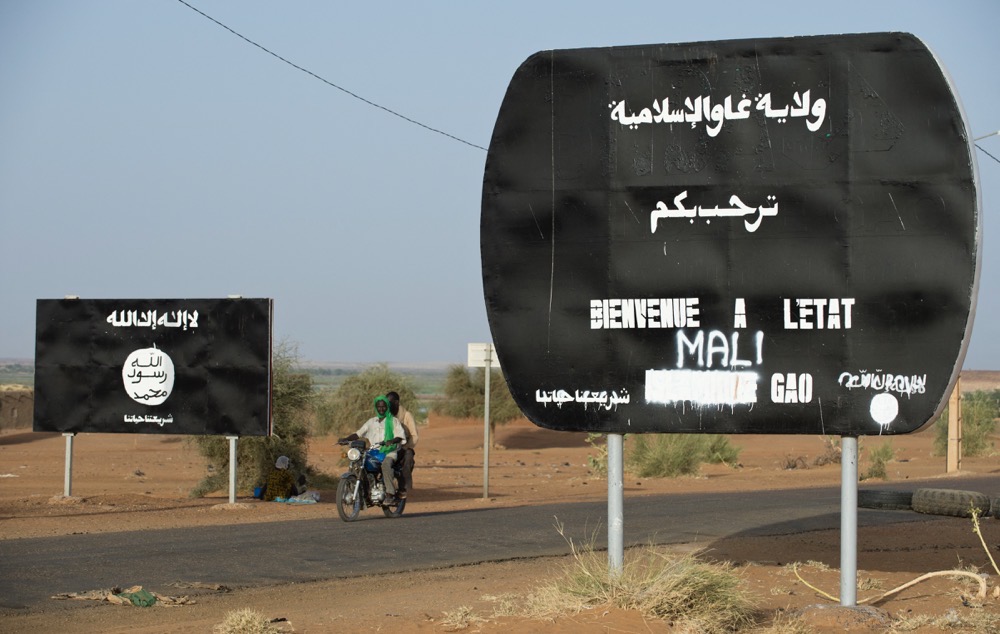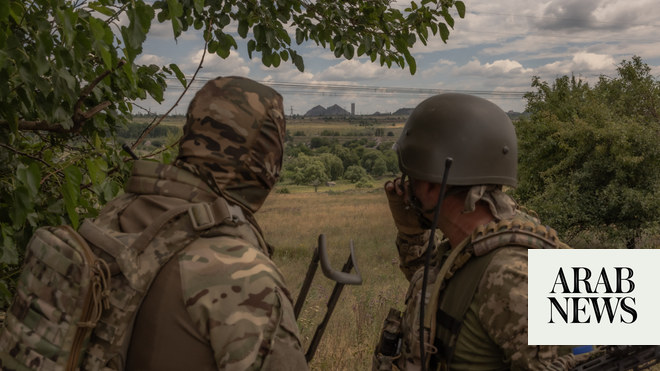N'DJAMENA, Chad: A top UN official issued a stark warning earlier this month that terrorism and organized crime from violent extremist groups linked to al-Qaeda and Daesh are escalating into a pervasive threat across West Africa and the Sahel region.
The threat is now spilling over into coastal West Africa, suggesting the world may be waking up too late to the unfolding crisis.
Statements by Leonard Simao, the UN Special Representative for the Sahel and West Africa, highlighted the rise of illegal trade in drugs, weapons, minerals, people and even food.
Hundreds of people were killed in terrorist attacks in the first half of 2024 alone, reflecting a dramatic escalation in violence.

Members of the military junta arriving at the Malian Ministry of Defense in Bamako, Mali. (AFP)
These developments underscore the complex and multifaceted nature of this challenge. The nexus of terrorism with organized crime networks has created an unstable environment where insecurity is the norm.
“This instability is also significant for the international community. As extremist groups grow stronger, humanitarian, economic and political impacts risk reverberating far beyond Africa's borders,” Moustapha Saleh, a Chadian security expert, told Arab News.
The situation is further aggravated by recent political upheavals. The G5 Sahel, a French-backed alliance meant to coordinate security and development issues in West Africa, collapsed last year after the departure of the military junta-ruled states of Mali, Niger and Burkina Faso.
This prompted the US and other Western countries to help Ghana and neighboring coastal West African nations strengthen their defenses. Although Ghana has not yet faced direct militant violence, Togo, Benin and Ivory Coast have suffered attacks near their borders in recent years, illustrating the growing threat of regional instability.
But aid to West Africa still falls short compared to the aid offered to Ukraine, Ghanaian President Nana Addo Dankwa Akufo-Addo said in a recent interview.
US aid to Ukraine since the Russian invasion has climbed to $113 billion. By contrast, combined EU, UK and US aid to the Economic Community of West African States, the bloc known as ECOWAS, came to a relatively small $29.6 million over the same period.

The objective of the 2020 operation in Menaka, Mali was to reduce the number of weapons in circulation. (AFP)
“Military regimes often struggle with legitimacy and resources, leaving them ill-equipped to handle the sophisticated and well-financed operations of extremist groups. The lack of international military support has made these nations vulnerable and the consequences are getting worse,” Saleh said.
The sudden shift has opened the floodgates to an influx of extremism as these countries seek to fill the security vacuum left by the withdrawal of foreign troops.
Many Sahel countries are now turning away from the West to find an ally to bolster their defenses. Russian mercenary group Wagner has reportedly deployed contractors and military equipment in several West African countries, including Mali and Burkina Faso, over the past two years.
The human toll of this escalating crisis is staggering. During the first six months of 2024, hundreds of civilians were killed in terrorist attacks. Communities are being torn apart and displacement of people is reaching unprecedented levels. Refugee camps are expanding as people flee violence, leading to a desperate need for humanitarian aid.
In addition, human trafficking is becoming a critical issue. Vulnerable populations are exploited, sold into slavery or forced into militant groups. Illegal emigration from West African countries to Europe via the usual migration routes is on the rise.

Cars allegedly burned by members of the Islamic State West Africa Province (ISWAP). (AFP)
Meanwhile, drug and arms trafficking not only funds extremist operations, but also fuels further violence and creates a vicious cycle of instability.
The economic consequences are just as serious. The growing illegal trade in minerals, which include gold, diamonds and other valuable commodities, is depriving nations of vital income. Instead of funding development and infrastructure, these resources fund terror and crime.
Disruption of legal trade routes due to insecurity has crippled local economies. It is increasingly difficult for farmers and traders to transport goods, leading to food shortages and rising prices.
“Broader economic instability discourages foreign investment and hampers development, further exacerbating poverty and disenfranchisement,” Saleh said.
Until last year, global support for the fight against terrorism in the Sahel region was significant, with contributions from various countries and organizations. The US, with its drone bases in Niger and Burkina Faso and around 1,000 troops in the region, has played a vital role.

A military junta took power in Mali on August 19, 2020. (AFP)
France has been a prominent supporter through its military operations such as Operation Barkhane, based in Chad and involving around 4,000 personnel at its peak. It was focused on securing the region and fighting terrorism in cooperation with local forces in Mali, Niger and Chad.
An EU training mission and an EU capacity-building mission also played a role until a wave of coup d'etat caught the region by surprise. As a result, it is impossible for Western governments to continue military cooperation with hostile juntas.
But given the severity of the current crisis, many experts believe the world cannot afford to look away. “The international community must recognize that threats emanating from the Sahel and West Africa are not limited to the region but have global implications,” Souley Amalkher, a Nigerian security expert, told Arab News.
INNUMBERS
• 361 conflict-related deaths in Niger in the first three months of 2024. (ACLED)
• More than 25.8 million people in Burkina Faso, Mali, Niger and Nigeria in need of humanitarian assistance this year.
• More than 6.2 million people currently internally displaced in Burkina Faso, Mali, Niger and Nigeria.
• More than 32.9 million people facing food insecurity in Burkina Faso, Mali, Niger and Nigeria.
Terrorism and organized crime in these areas can destabilize entire continents, disrupt global trade and fuel mass migration. “There is also a risk that these extremist ideologies will spread beyond Africa and pose a security threat to other regions,” Amalkher said.
Experts say that the spread of extremist ideologies and the presence of terrorist groups in West Africa will lead to instability that may also affect the Arabian Peninsula.
They say the pro-Western Gulf states, while already supporting counter-terrorism efforts in West Africa, must change their strategies given the recent dissolution of the G5 Sahel.

A motorbike drives past a sign welcoming people to the “Islamic State of Gao”, which was changed to “Welcome to the State of Mali” in the Malian city of Gao. (AFP)
Solving this crisis requires a multi-pronged approach, experts say, pointing to what they say is a need for a combination of immediate and long-term strategies.
“Immediate actions should include the restoration of the military partnership. It is essential to restore and strengthen military cooperation with international partners, as this would provide the necessary support to local forces to effectively counter the extremist threat,” Lauren Mitchel, a security expert at the Washington Institute of Peace, told Arab News.
Humanitarian aid is also essential. Immediate and substantial assistance is needed to support the displaced population and provide basic needs such as food, water and medical care.
In addition, strengthening border controls and international cooperation is essential to disrupt human traffickers' networks. This includes better intelligence sharing and coordinated law enforcement actions.
Long-term solutions focus primarily on economic development and the support of projects that promote self-sufficiency.

A military junta took power in Mali on August 19, 2020. (AFP)
“This includes building infrastructure, creating jobs and promoting sustainable agricultural practices to ensure food security,” Mitchel said.
Analysts have found that providing young people with education and training can help prevent them from being recruited by extremist groups. Social programs that address poverty and disenfranchisement are vital to long-term stability.
He argues that international efforts should focus on facilitating the transition to stable, civilian-led administrations capable of effectively managing and addressing the needs of their populations.

